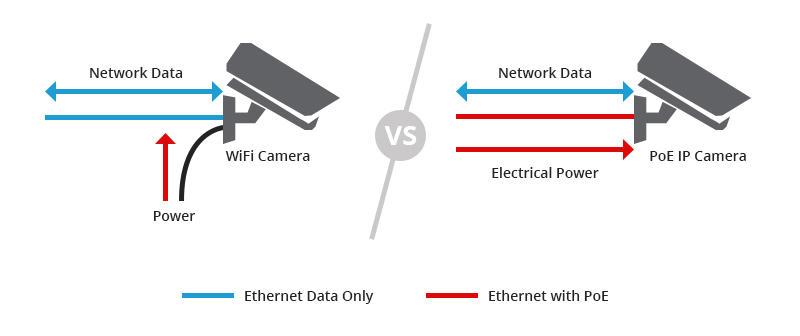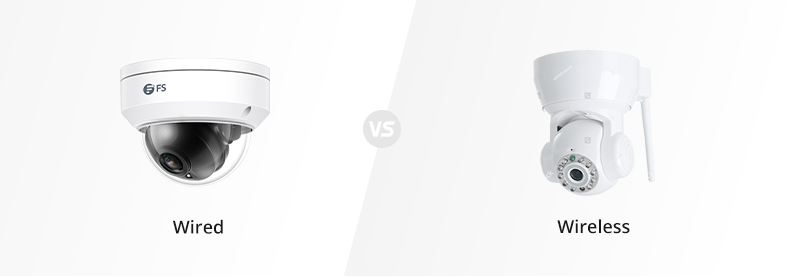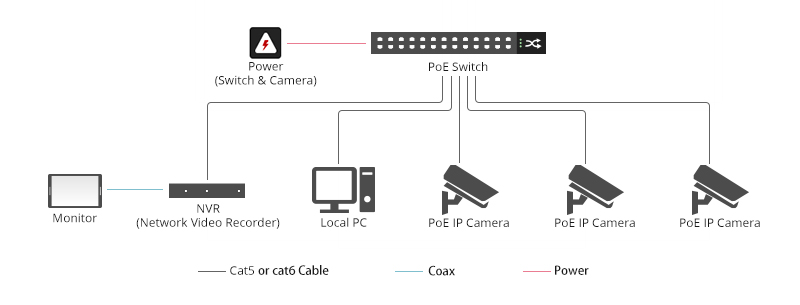Comparison Between Wired vs Wireless Security Cameras
Security has always been a trending topic, surveillance at home or in the offices is increasingly ubiquitous for the sake of safety. IP cameras can provide viable solutions for users to monitor the specified regions they require.Generally, there are two types of video security systems- wired security camera system and wireless security camera system. Then what are the differences between them? What special advantages or disadvantages do they have? And how to choose between them? In this article, we will address all these concerns for you.
Introduction of Wired and Wireless Security Camera Systems
The wired camera security system is regarded as the traditional video surveillance solution. As the name implies, this system requires cables for power, internet connection, and video transmission. Wired cameras transmit video and audio signals through a cable to the central management system. With the introduction of Power-over-ethernet (PoE) technology, both power and internet connection will be realized with one single cable. It's like killing two birds with one "cable." IP cameras that support PoE technology, also known as PoE cameras, are able to send the video feed they record to the network while receiving both data and power from that very same PoE switch.

As an alternative, a wireless camera system that adopts wireless technology allows cameras to connect to a router wirelessly without a hardwired connection. However, wired power is still required. The Wi-Fi IP camera operates by transmitting security footage from the camera to the recorder, which can be accessed within a network or remotely. That is to say, the user has access to the footage either through a built-in device or cloud storage.
Pros and Cons of Wired vs Wireless Security Cameras
Either wired or wireless security cameras can offer basic monitoring functions. The differences between them, however, are rather distinct. The following part will explain their benefits and drawbacks respectively.
Pros of Wired Cameras
-
Reliable and Stable Connection: Wired security cameras including PoE cameras are not susceptible to interference and jamming from wireless signals due to the physical wired connection.
-
Consistent Video Quality: A stable wired connection will lead to strong video and audio signals to record high-quality video.
-
Constant Power: With wired power, the cameras will keep recording as long as the electrical grid of the building remains sound.
Cons of Wired Cameras
-
Require Professional Installation: Since there is cabling work, professional installation is most likely necessary.
-
Lack of Flexibility: After a wired camera is tethered to a specific location, it may take a lot of work to move it to another location.
Pros of Wireless Cameras
-
Easy to Install: The deployment of wireless cameras is relatively simpler since there is no need to run network cables behind the walls.
-
High Flexibility: It's easy for the owners to redeploy those wireless/ Wi-Fi cameras or to scale up.
-
No Wire to Cut: No chance for intruders to cut the wire because there is none.
Cons of Wireless Cameras
-
Unstable Video Signal: For signals sent over Wi-Fi or other wireless networks, it's more apt to lose connection or suffer interference.
-
Cybersecurity: There is always vulnerability to Internet connectivity, so it will be less secure than a wired option.
-
Power Failure: Wireless cameras are prone to losing charge when encountering batteries running out.
PoE vs Wi-Fi Security Camera, How to Make a Proper Selection?
Since both Wi-Fi and PoE security cameras have their pros and cons, it's not simple to make a quick and wise decision. Ask yourself several questions before purchasing: How are my daily network and power conditions? What kind of application do I want to realize? How many devices do I require to set up? And should I consider future upgrades? Take your time, evaluating your current situation based on the following considering factors.

Networking Environments
The most important point is to evaluate your current network and power situations. The wireless signal strength, or the scope of coverage, is tied to various factors like the router, the interference, the route signals have to take to get to your cameras, and so on. Besides, the existing power design also has an impact on your future security system decisions.
Application Scenarios
Generally speaking, wireless or Wi-Fi IP cameras are widely used for non-professional indoor home security, and wired cameras are installed for outdoor surveillance systems. When planning the IP cameras outside, make sure the models you purchase are weatherproof. In addition, wired security camera systems are normally for homeowners or businesses with relatively permanent uses, while wireless systems are ideal for renters or businesses in temporary locations.
Scale & Scalability
The size of your property and the number of cameras needed will determine your decision between wired and wireless security cameras. If you want to install one single IP camera for home monitoring, you can pick a wireless Wi-Fi IP camera. Just make sure that the wireless IP camera is installed within coverage of your Wi-Fi router. However, many homes or business owners with large properties want comprehensive coverage with seamless performances. A wired system that can support and link all the cameras is recommended. Furthermore, PoE technology makes it more flexible when adding, moving, changing, or temporarily deploying security cameras, which is ideal for future upgrades. Check the picture below to see how PoE cameras are deployed.

To sum up, if you want easier installation and more flexibility for your current small-scale indoor applications, stick to wireless Wi-Fi security cameras; If you require a stable and scalable network with better management for outdoor applications, turn to wired PoE security cameras is more advisable.
Further Considerations
The need for security in residential applications coupled with the rising trend of smart homes/offices has triggered an increased adoption of both wired and wireless security cameras for homes and commercial buildings, which is expected to drive the IP camera market over the coming years. When comparing wired vs wireless security cameras, we may notice that wired cameras feature with faster transmission speed, higher reliability, better security, and wider coverage for more application scenarios. With the popularity of PoE technology, these PoE cameras are poised to win more market share and will be an inevitable trend in the predictable future.
You might be interested in
Email Address

-
PoE vs PoE+ vs PoE++ Switch: How to Choose?
Mar 16, 2023














